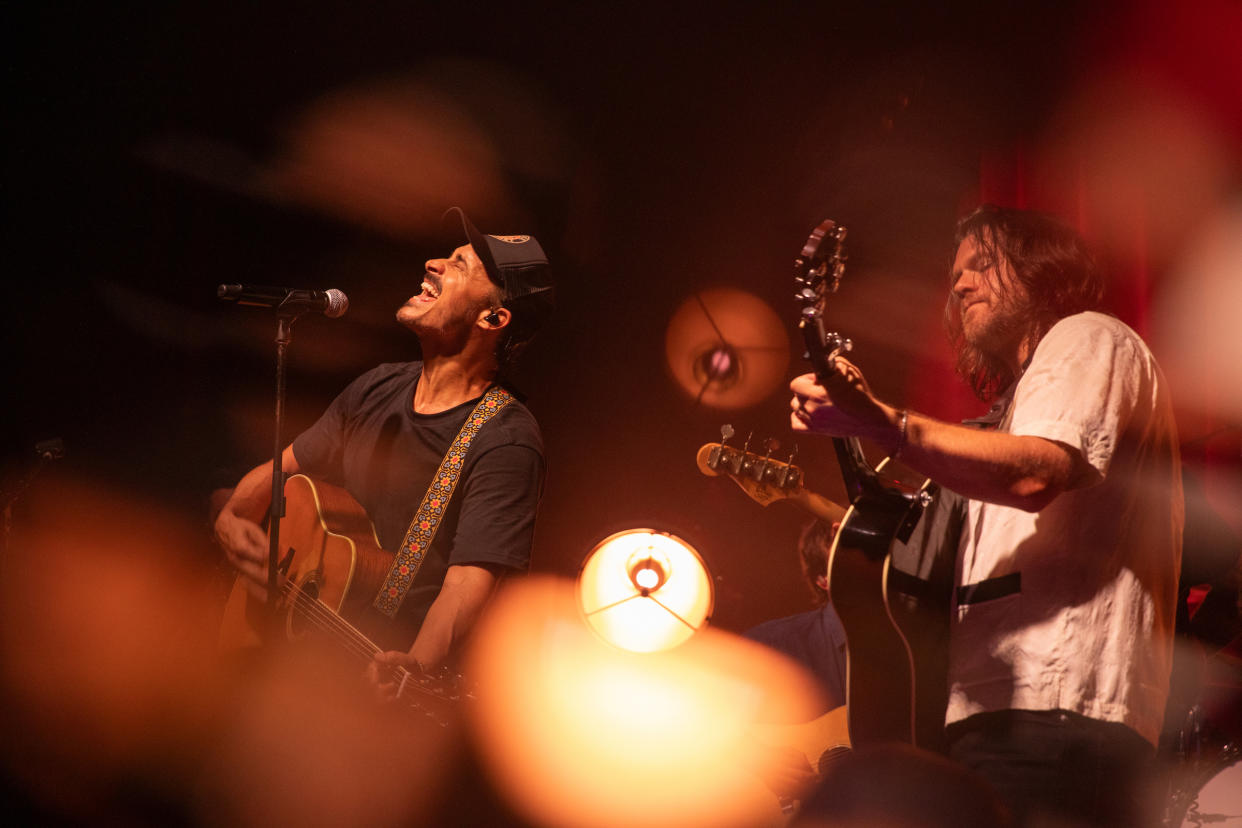Time Well Spent: The Fray Return From a Five-Year Hiatus

In the short space of just a few years, Denver-based pop-rock group the Fray got together, secured a record deal, released a multi-platinum debut album, won three Billboard Music Awards, and landed four Grammy nominations. After three more LPs, and seemingly with much left to say, they went on hiatus in 2019; at the time there was little reason to think they’d ever return. But with a realignment of priorities and a fresh perspective, the Fray are back with a new EP, out September 27.
The Fray formed in Denver in 2002, writing impassioned, thoughtful, and emotional songs that bridged indie rock and mainstream pop. And in a departure from groups centered around one singer/songwriter, the Fray took a more balanced approach.
More from Spin:
On their 2002 debut EP, Movement, guitarist Joe King sang two songs, and keyboardist Isaac Slade took the lead on the others. And while Slade would gradually evolve into a role as the Fray’s de facto frontman, songwriting duties remained very much collaborative.

The Fray paid their dues in those early years, playing clubs and theaters as an opener for bigger names, sometimes securing spots as the second- or third-billed act on a festival lineup. Cultivating a local following, they won polls and earned positive press. Their self-recorded demo of “Over My Head (Cable Car)” became popular on Denver radio. And even with two independent EPs to their credit, the Fray had written enough new material for a full-length; they were ready for a major-label deal.
Epic Records took notice, signing the group in late 2004 and steering them into the studio. The result of those sessions was How to Save a Life, released in September 2005. Once that record hit the stores, fame came quickly. Riding high on the breakout success of a pair of hit singles—a new recording of “Over My Head (Cable Car)” and the album’s title track—the Fray quickly found themselves playing more than 100 live dates a year. How to Save a Life eventually earned quadruple-platinum status in the U.S., going Top 10 in six other English-speaking countries.
Thanks to strategic placement of its songs on popular TV shows including Grey’s Anatomy, One Tree Hill, and Lost, the band’s second album, 2009’s The Fray, debuted at No. 1 on Billboard’s album chart. Subsequent releases—2012’s Scars & Stories and 2014’s Helios—sold fewer copies but earned some positive notices. A career retrospective, Through the Years: The Best of the Fray collected songs from the band’s four LPs plus three new tracks; the album peaked at No. 13 on the Top Rock Albums chart.
That release capped an impressive run, but it also signaled the end of a chapter: In 2019, with the five-album commitment to Epic fulfilled, the Fray announced an indefinite hiatus. A succession of years at the top led to exhaustion and a desire for a break from the demands of recording and touring.
That collective decision brought both a sense of relief and resignation. “I was grateful for how lucky we were to experience everything that we did, but I had to surrender to the fact that it was done,” says King. “And I found peace with it.” At the time, King says, he believed that people would eventually stop thinking about the Fray: “When you go away, people will forget about you.”

But King never stopped writing songs. And he discovered that the pandemic-era lockdowns had an upside: more time to focus on creative endeavors. “Like everybody, I was just trying to hang on for dear life,” he says. And when the world opened back up, he found that the creative juices flowed even more freely. “These songs kept coming. It became 10 songs, then 20, and then 30. And I was grateful for that.”
Yet the question remained: What to do with all these songs? Though Slade had moved on from the group—today he owns and operates a record store on Washington’s Vashon Island—King remained close to lead guitarist Dave Welsh and drummer Ben Wysocki. The three began talking about the future. Is there something more to say? What do I want my relationship with this band to be?
“And that sparked everything for me,” King says. “It lit something that I couldn’t stop.” He was certain that the Fray did have more to say. “I thought, ‘If we love this band, we can do whatever we want.’” And when Welsh and Wysocki agreed, they asked King if he had songs. “I was like, ‘Oh, yeah!’” he says with a laugh. But he didn’t want to overwhelm his bandmates. “I said, ‘I’m going to send you four; let’s start with those, and we’ll see where it goes.’”
The process of developing full-band arrangements for those went well, so they added two more. The six songs from that crop—including the new single, “Time Well Wasted”—make up the pointedly titled EP The Fray is Back.
When the Fray decided to get back together, there was discussion about how to handle the fact that the singer of many of their hits was no longer part of the group. They briefly considered applying “the Van Halen model, bringing in a Sammy Hagar,” King says with a laugh. But after a July 2022 show at Busch Gardens in Williamsburg, Va., where he somewhat reluctantly took over as lead singer, King realized that it made sense to go that route instead.
“These songs want me to sing them,” King says. “Not only the songs on the new EP, but our entire catalog.” He says that it feels as if the songs are raising their hands to say, “We’d like this band to perform us now. We’re ready.” King views The Fray is Back and its supporting tour as the first paragraph of a new chapter for the band. “And there’s more,” he promises.
A sense of balance informs the Fray’s return. King recalls some sage advice he got from a well-known touring musician many years ago, advice that he didn’t fully understand at the time. “He told me, ‘90% of [the music business] is all the other stuff you’ve got to deal with, and only 10% is the music.’” His point was that it’s easy to become overwhelmed by those other things—business matters, critics and such—and lose sight of the important part of the equation.
“In the early Fray era, I would sometimes get consumed with all those things that really aren’t up to me,” King says. Today he puts things into a different perspective. “The only thing that’s up to me is that 10%,” he says with a smile. “Knowing that frees me up to focus on the things that I love: recording and releasing our music.”
A big part of what brought the Fray back together was a shared understanding of music’s positive power. “It’s an incredible opportunity that we have,” he says. “We can bring people together for a shared experience for a couple of hours. That’s what you dream of doing. The fact that we get to play music for people, that’s everything for us.”
To see our running list of the top 100 greatest rock stars of all time, click here.
